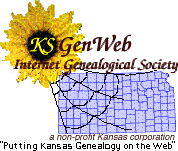 |
Chase County Kansas Historical
Sketches
|
O.H. Drinkwater
Founded Cedar Point
Article from Cottonwood Valley News
Cedar Point, Kansas, October 10, 1912
It was at 10:00 a.m. on the 11 day of April,
1855, that, O.H. Drinkwater, accompanied by his
brother, after staying all night at the American
Hotel, then the only hotel in the village of Kansas City, drove an ox team across the line into
Kansas.
He headed westward and on the afternoon of
April 15, stopped at a sod shanty on the south bank
of the river, at a point where Kansas avenue now
crosses the river, and where his father, who had
preceeded him was hatching. The next day he commenced cutting Cottonwood logs down on the "san-
dy bottoms" and these logs were used in the construction of a saw mill that was built by the Emigrant Aid Society and which was the first substantial building in the city of Topeka.
His father took a claim two and a half miles
from Kansas Avenue down on Shunganunga creek,
and they also rented 80 acres of broke land a few
miles west of Topeka from a Pottowatomie Indian
Chief named Abram Burnett. After the corn crop
was laid by that spring, he took the ox team, "Moo-
ley and Dave" and started freighting between Kansas City and Topeka. He hauled many goods for
Allen and Gordon, at that time the only merchants
in Topeka, getting $1. per hundred pounds for same.
Sometime during that fall, 1855, he hauled from
Kansas City, the first printing press ever brought
to Topeka. The press was brought there by E.C.K.
Garver who started a paper called the Kansas Freeman. This paper was issued in the upper room of a
little frame building at the corner of fifth street and
Kansas Avenue across the street from where the
post office building now stands.
During a severe snow storm, on the 8th day of
December 1856, he buried a sister, at a lonely spot
which is now the center of Kansas avenue directly
in front of the Copeland hotel. He at one time traded the land on which the State Capital now stands,
for a cow. In 1857 he was elected a member of the
Free State Legislature, and served at the last session of that body.
In 1857 he came to Chase county and took a
piece of land at the mouth of a creek which he named Cedar. He secured the establishment of a post
office on this farm and had it named Cedar Point,
and was the first postmaster. He afterward laid out
the town of Cedar Point, and when the city was incorporated this summer he was instrumental in getting that done and in establishing the boundaries of
the city, and was the unanimous choice of its citizens for the first Mayor but as he did not reside inside the corporation was not eligible to the office.
In 1867, in company with J.L. Crawford, he
commenced the erection of a mill at this place. He
bought out Crawford in 1868 and completed the mill
alone. The water wheel used in the mill he had
shipped to Topeka, then the nearest railroad point,
and hauled it from there to Cedar Point on wagon.
In 1869, L.C. Smith and P.P. Schriver each purchased a one third interest in the mill and in 1870
Drinkwater and Schriver bought out Smith and the
business was conducted under this name until 1891.
Mr. Drinkwater sold his interest to M. Gulliford with
the understanding that he should plan for and install
for him the new roller system, which he did.
He was a delegate to the National convention
at Cincinnati that nominated Abraham Lincoln for
President, and in 1896 was a delegate to the national convention that nominated W.J. Bryan. He was
one of the old Peoples Party. He was elected to the
legislature and has also held the offices of postmaster, Justice of the peace, Probate Judge, County
Commissioner, and other offices of public trust and
was probably the oldest Notary Public in the state,
having received his first commission from the first
Governor of Kansas and having held one continuously ever since.
>
At the opening of the war he was commissioned
a Captain in the Fifth Regiment Kansas Home Brigade, and served until near the close of the war
when he was compelled to return home because of
illness. He was a member of the Masonic Lodge,
the G.A.R. and Sons of the American Revolution.
Written by Mrs. Alice Vansickle
(Mr. Drinkwater's daughter, Mrs. Alice Vansickle
still resides in the home on the hill at Cedar Point).
Chase County Centennial, 1872 - 1972
by Lorna Marvin.
Please submit your historical sketches.
Background and KSGenWeb logo were designed and are copyrighted by
Tom & Carolyn Ward
for the limited use of the KSGenWeb Project.
Permission is granted for use only on an official KSGenWeb page.
The USGenWeb Logo was designed by Linda Cole.
 |
 |